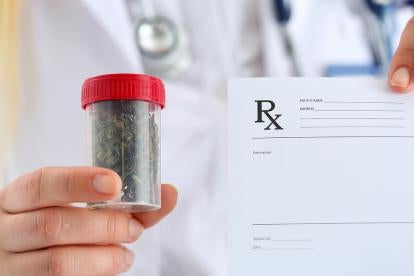Effective July 26, 2018, Oklahomans will be able to legally use medicinal marijuana under state law. The change follows a June 26, 2018 ballot measure, State Question 788, approved by 56% of voters. Oklahoma’s new law, cheekily coded 63 Okla. Stat. § 420 et seq., expands the prior permissible use of cannabidiol (CBD) oil for limited purposes, now allowing licensed medicinal marijuana consumption. The ballot measure initially appeared in 2016, but was delayed for several years by a series of legal challenges concerning changes to its title, ultimately resolved by the Oklahoma Supreme Court in March 2017.
Consistent with the secondary wave of state laws legalizing medicinal marijuana, Oklahoma’s law contains an anti-discrimination provision providing that employers “may not discriminate against a person in hiring, termination, or imposing any term or condition of employment or otherwise penalize a person based on their status as a medical marijuana license holder,” unless failing to do so would cause the employer to “imminently lose a monetary or licensing related benefit under federal law or regulation.” 63 Okla. Stat. § 425(B)(1)-(2). Further, employers may not take action against a license-holder solely based upon the results of a positive drug test for marijuana or its components. 63 Okla. Stat. § 425(B)(2). Employers should note that these protections do not extend to use or possession of marijuana in the license-holder’s place of employment, or during the hours of employment. Id.
Oklahoma’s law differs from other states’, however, in that it does not predicate approved marijuana use on specific qualifying medical conditions. Instead, medical license applicants need only obtain the signature of an Oklahoma Board certified physician, who recommends the license “according to the accepted standards a reasonable and prudent physician would follow when recommending or approving any medication.” 63 Okla. Stat. § 420(M). Moreover, the law incorporates protections for the recommending physician, who “may [not] be unduly stigmatized or harassed for signing [the] medical marijuana license application.” Id.
Looking forward, interested parties should expect to see regulations introduced to further refine terms of use. Governor Mary Fallin previously criticized the law as too “loose[ly written],” such that it “opens the door for basically recreational marijuana[,]” and threatened to call a special session of the legislature to develop regulations if the ballot measure succeeded. Rather than call a special session, however, Governor Fallin signed emergency legislation on July 11 adopting rules created by the State Board of Health, including a ban on the sale of smokable marijuana. In response, activists are pushing to legalize recreational marijuana use as an “insurance policy” against these and other potential restrictive regulations. At least two parties have filed lawsuits challenging the validity of the recent Department of Health rules. Additionally, Oklahoma voters will weigh in on Questions 796 and 797 this November—provided those questions receive the requisite 124,000 signatures by August 8, 2018—deciding whether to classify marijuana as an “herbal drug” and whether to permit adults 21 years or older to recreationally use marijuana, respectively.




 i
i


